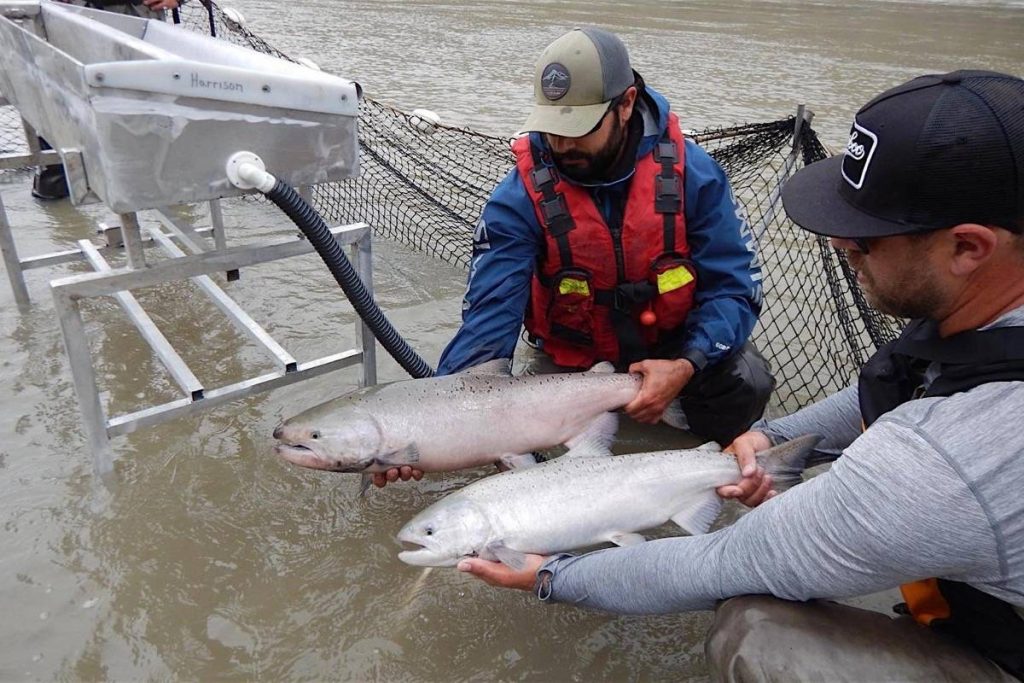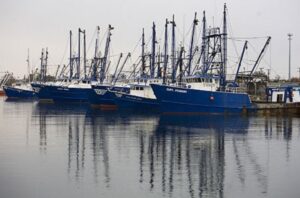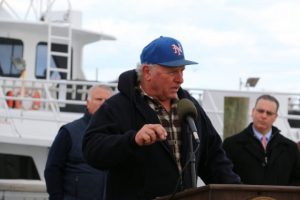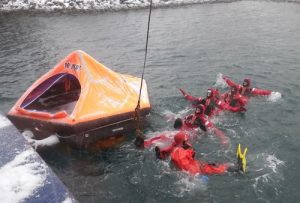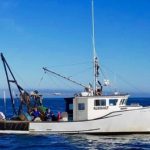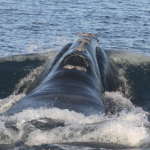Tag Archives: California Department of Fish and Wildlife
Commercial Spiny Lobster Fishery Closed at Anacapa Island and the East End of Santa Cruz Island Due to Public Health Hazard
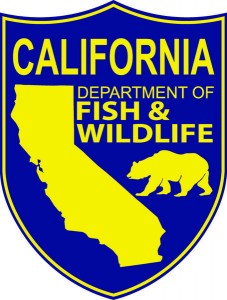 California Department of Fish and Wildlife (CDFW) Director Charlton H. Bonham has enacted a commercial spiny lobster fishery closure effective immediately. State health agencies determined that spiny lobster near Anacapa Island, Ventura County and the east end of Santa Cruz Island, Santa Barbara County had unhealthy levels of domoic acid and recommended closure of the commercial fishery. The recreational fishery for spiny lobster remains open statewide with a warning from the California Department of Public Health (CDPH) to recreational anglers to avoid consuming the viscera (tomalley) of spiny lobster. click here to read the story 21:30
California Department of Fish and Wildlife (CDFW) Director Charlton H. Bonham has enacted a commercial spiny lobster fishery closure effective immediately. State health agencies determined that spiny lobster near Anacapa Island, Ventura County and the east end of Santa Cruz Island, Santa Barbara County had unhealthy levels of domoic acid and recommended closure of the commercial fishery. The recreational fishery for spiny lobster remains open statewide with a warning from the California Department of Public Health (CDPH) to recreational anglers to avoid consuming the viscera (tomalley) of spiny lobster. click here to read the story 21:30
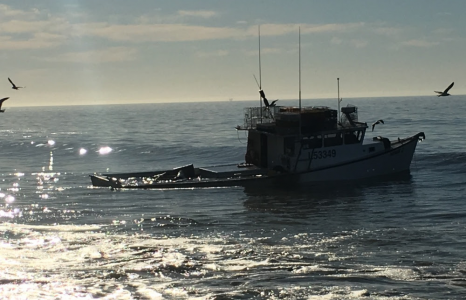
Coast Guard, partners respond to grounded fishing vessel near El Capitan State Beach
Coast Guard and local partner agencies are responding to a grounded commercial fishing vessel near El Capitan State Beach Saturday. At approximately 5:30 a.m., the crew aboard the Kaylee J notified Coast Guard Sector Los Angeles-Long Beach that their vessel ran aground and requested assistance. The crew aboard were reportedly not injured. Coast Guard Marine Safety Detachment personnel in Santa Barbara responded and reported no oil pollution in the water. A unified command was established between the Coast Guard, California Department of Fish and Wildlife’s Office of Spill Prevention and Response and California State Parks to remove oil and hazardous materials held within the vessel’s structure. The cause of the incident is under investigation. -USCG- 18:41
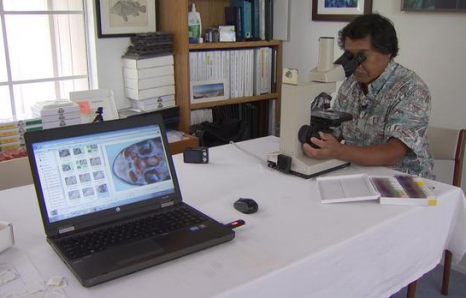
Thousands of Sharks, Other Sea Life Mysteriously Die in San Francisco Bay, State Says No Funding Available to Determine Cause
As many as 2,000 leopard sharks have mysteriously died in the San Francisco Bay over the past few months. The California Department of Fish and Wildlife says determining the cause is not a priority for the state since the sharks are not threatened or endangered, however, scientists say additional research and resources are crucial since the threat is now believed to be preying on other marine life. “This pathogen can tackle a variety of different species … we’ve had a much more diverse group of fish that have been found dead in the San Francisco Bay.” At least 500 bat rays, hundreds of striped bass, 50 smooth-hound sharks and about 100 halibut died in the bay between February and July, according to Okihiro’s estimates. Video, click here to read the story 09:24
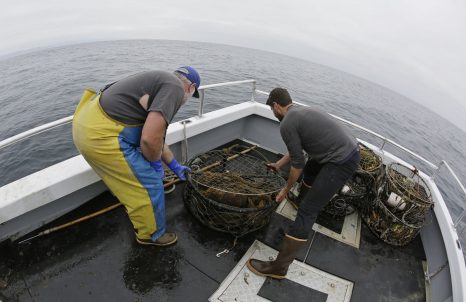
Environmental group sues California over whale-killing gear
An environmental group sued the state of California on Tuesday for allegedly not doing enough to keep Dungeness crab fishery gear from killing protected whales. The Center for Biological Diversity filed its lawsuit in federal court in San Francisco, saying the California Department of Fish and Wildlife is liable for a surge in entanglements of endangered whales and sea turtles because it authorizes and manages operation of the fishery. click here to read the story 15:18
Oregon group tries to dodge California’s fate by addressing whale entanglement issues early
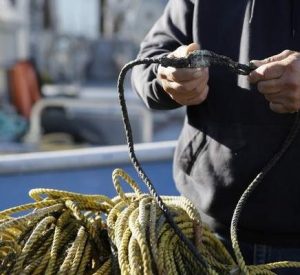 Oregon’s commercial fishing industry is trying to get ahead of a problem that could put California in the middle of a lawsuit and has the potential to drastically change Dungeness crab fisheries on the West Coast. Last year, 71 whales tangled with U.S. fishing gear off the coasts of California, Oregon and Washington state, as well as neighboring countries — the highest annual total for the West Coast since the National Oceanic and Atmospheric Administration began keeping such records in 1982. Sixty-six of these incidents happened in California, many of them involving endangered humpback whales tangled in commercial crab gear. At the end of June, the Center for Biological Diversity announced its intent to sue the California Department of Fish and Wildlife, which manages the fishery, for “causing the take of threatened and endangered whales and sea turtles.” click here to read the story 15:27
Oregon’s commercial fishing industry is trying to get ahead of a problem that could put California in the middle of a lawsuit and has the potential to drastically change Dungeness crab fisheries on the West Coast. Last year, 71 whales tangled with U.S. fishing gear off the coasts of California, Oregon and Washington state, as well as neighboring countries — the highest annual total for the West Coast since the National Oceanic and Atmospheric Administration began keeping such records in 1982. Sixty-six of these incidents happened in California, many of them involving endangered humpback whales tangled in commercial crab gear. At the end of June, the Center for Biological Diversity announced its intent to sue the California Department of Fish and Wildlife, which manages the fishery, for “causing the take of threatened and endangered whales and sea turtles.” click here to read the story 15:27
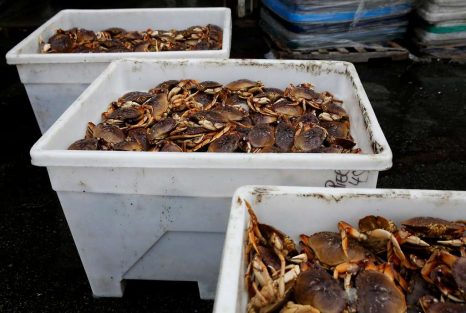
California Dungeness crab industry bounces back with strong season
Crabbers, seafood processors and state biologists agree that the most recent Dungeness crab season, which ended June 30 south of Mendocino County, was above average. Considering the disastrous previous season of 2015-16, which featured historic, months-long closures in the Dungeness crab fishery due to the presence of domoic acid in the animals, that’s more than above-average news. “We made some money,” said Shane Lucas, who fishes for crab out of Bodega Bay, where he also owns the Fishetarian Fish Market. Based on preliminary data, the 2016-17 season brought in over 21 million pounds of Dungeness crab to California ports, worth $66.7 million.,,, But this year’s crab season was not without its issues. click here to read the story 16:33
Commercial rock crab season emergency closure extended for public safety
 The emergency closure of the Northern California commercial rock crab season, which was set to end today, has been extended by the California Department of Fish and Wildlife (CDFW) due to public safety concerns over potential toxins in the area. The closure covers commercial rock crab fishing from Bodega Bay in Sonoma County to the Oregon border. The closure comes after state health officials detected high levels of domoic acid in rock crabs found in the region last fall, which can pose health risks and be toxic if eaten. The closure was set to expire today, but CDFW Director Charlton H. Bonham extended the commercial crabbing restriction using a new authority granted to him this year. Click here to read the story 09:42
The emergency closure of the Northern California commercial rock crab season, which was set to end today, has been extended by the California Department of Fish and Wildlife (CDFW) due to public safety concerns over potential toxins in the area. The closure covers commercial rock crab fishing from Bodega Bay in Sonoma County to the Oregon border. The closure comes after state health officials detected high levels of domoic acid in rock crabs found in the region last fall, which can pose health risks and be toxic if eaten. The closure was set to expire today, but CDFW Director Charlton H. Bonham extended the commercial crabbing restriction using a new authority granted to him this year. Click here to read the story 09:42
Crab fishing organization says State of California commission unfairly changed policy on crabbing season
 A crabbing association is suing the California Department of Fish and Wildlife and California Fish and Game Commission, alleging violation of federal law. Tri-State Crab Producers Association filed a complaint on April 5 in the San Francisco County Superior Court against the defendants alleging that they attempted to alter and delay the beginning of the crabbing season. According to the complaint, the plaintiff alleges that it suffered damages due to the changes in the departments’ policies regarding crabbing season. Click here to read the story 09:40
A crabbing association is suing the California Department of Fish and Wildlife and California Fish and Game Commission, alleging violation of federal law. Tri-State Crab Producers Association filed a complaint on April 5 in the San Francisco County Superior Court against the defendants alleging that they attempted to alter and delay the beginning of the crabbing season. According to the complaint, the plaintiff alleges that it suffered damages due to the changes in the departments’ policies regarding crabbing season. Click here to read the story 09:40
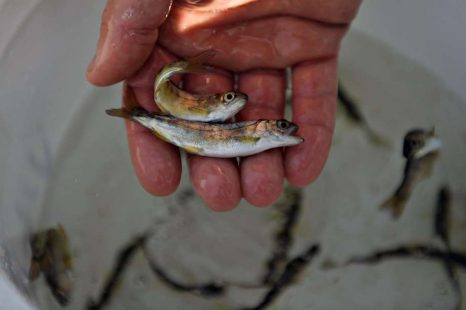
200,000 Salmon survive Oroville spillway’s erosion only to suffocate this week
A quarter-million hatchery salmon survived the near-collapse of a California dam’s spillway this winter, only to suffocate after a pump failed this week, officials said Thursday. They were among about 5 million baby fall-run Chinook salmon that were rescued in February after tons of mud washed down the Feather River, said California Department of Fish and Wildlife spokesman Andrew Hughan. The erosion came from the failing emergency spillway near the Oroville dam that caused the precautionary evacuation of nearly 200,000 residents. Click here to watch video, read the story, and view 31 images 15:46
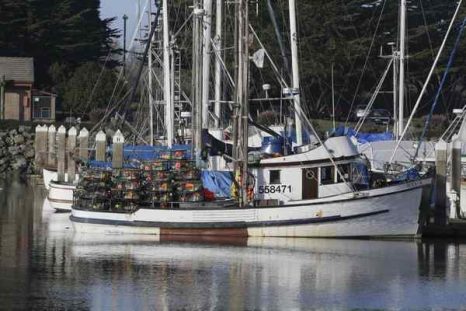
Congress to consider relief funds for California crab fleet as Brown proposes landing fee hike
Long-awaited federal funds to alleviate California’s crabbing fleet after last year’s dismal season could be approved by Congress as early as the next few weeks, according to California 2nd District Rep. Jared Huffman. Huffman (D-San Rafael) said Congress is set to vote on a supplemental budget appropriation to prevent a government shutdown in the coming weeks. He said he and a bipartisan group of legislators have signed on to a letter to House Speaker Paul Ryan and Minority Leader Nancy Pelosi urging them to include fishery disaster funds in this budget bill.,, Meanwhile at the state level, local legislators and fishing organizations are protesting Gov. Jerry Brown’s proposal to increase commercial fishing landing fees by as much as 1,300 percent in order to help close a $20 million shortfall in the California Department of Fish and Wildlife budget. continue reading the story here 16:09
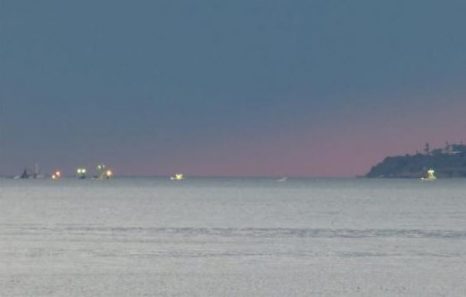
Squid boats dot Malibu coast – Roughly 40,157 tons of squid landed this season
Almost every night this winter, bright lights have appeared off the coast of Malibu. It’s an eerie sight on a foggy evening, suggesting something unearthly or supernatural, but the only thing these ghostly lights portend is the presence of Doryteuthis opalescens, the common market squid. It’s a good omen for California’s seafood industry. Market squid is one of California’s largest commercial fisheries, and tons of frozen California calamari are shipped all over the world each year. However, the species had almost entirely disappeared from Southern California waters last year. The absence of squid is being blamed on El Niño. California Department of Fish and Wildlife environmental scientist Laura Ryley studies squid. While concerns are being raised over the potential impact of prolonged ocean warming on the species, the return of more normal temperature conditions in the Pacific this winter appears to have signaled the return of the squid. Read the story here 09:22
More of Commercial Dungeness Crab Fishery to Open from Point Arena to Ten Mile; One Area Still Closed
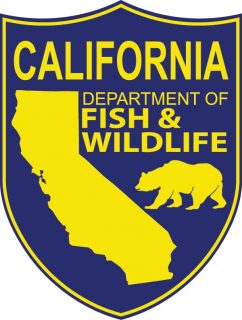 On Dec. 29, more of the California coastline will open to the commercial Dungeness crab fishery. Some previously closed areas will open at the recommendation of state health agencies, the California Department of Fish and Wildlife (CDFW) announced today. The area between Point Arena and Ten Mile River in Mendocino County will open on Dec. 29. However, due to persisting conditions of elevated domoic acid levels, the fishery will remain closed between Ten Mile River and Shelter Cove. The closed portions of the coast may open once testing by state agencies shows that domoic acid in crabs from the area no longer poses a significant risk to public health. On Dec. 29 at 12:01 a.m., the commercial Dungeness crab season will open from 38° 57.5′ N. Lat. (near Point Arena) to 39° 33.3′ N. Lat. (near Ten Mile River).The opener in this area will be preceded by a 64-hour pre-soak period commencing at 8 a.m. on Dec. 26. The area between Ten Mile River and Shelter Cove will remain closed until,,, Read the press release here 17:46
On Dec. 29, more of the California coastline will open to the commercial Dungeness crab fishery. Some previously closed areas will open at the recommendation of state health agencies, the California Department of Fish and Wildlife (CDFW) announced today. The area between Point Arena and Ten Mile River in Mendocino County will open on Dec. 29. However, due to persisting conditions of elevated domoic acid levels, the fishery will remain closed between Ten Mile River and Shelter Cove. The closed portions of the coast may open once testing by state agencies shows that domoic acid in crabs from the area no longer poses a significant risk to public health. On Dec. 29 at 12:01 a.m., the commercial Dungeness crab season will open from 38° 57.5′ N. Lat. (near Point Arena) to 39° 33.3′ N. Lat. (near Ten Mile River).The opener in this area will be preceded by a 64-hour pre-soak period commencing at 8 a.m. on Dec. 26. The area between Ten Mile River and Shelter Cove will remain closed until,,, Read the press release here 17:46
Crab pots set to drop
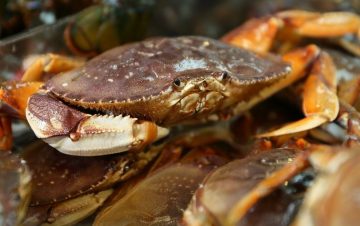 Spirits were high at the Crescent City Harbor as fishermen prepared crab pots and loaded gear onto boats Friday. Del Norte’s commercial Dungeness fishery is scheduled to open on time next week despite a delay to the season between according to the California Department of Fish and Wildlife. Local crabbers will be able to drop their pots at 8 a.m. Monday and retrieve their catch starting at 12:01 a.m. Thursday. “We’re very excited to go fishing after the catastrophe last year,” said Richard Nehmer, who was loading more than 400 crab pots onto his fishing vessel, “Resolution.” “The crab were excellent quality when they did the pre-season quality test,” Nehmer said. “They’re ready to harvest.” Last year’s delay to the crab fishery left many in the industry, including local fisherman Mike Diehl, struggling to make ends meet. “Right now I’m six months behind in rent,” Diehl said. “I used to have a pickup truck and a couple cars; I’ve had to sell off most of that stuff. I’ve pretty much been living without any heat in the house for the last four or five months, which was OK until this last month. There’s no money to be spent on anything; no Christmas, reduced birthdays.” Read the story here 11:16
Spirits were high at the Crescent City Harbor as fishermen prepared crab pots and loaded gear onto boats Friday. Del Norte’s commercial Dungeness fishery is scheduled to open on time next week despite a delay to the season between according to the California Department of Fish and Wildlife. Local crabbers will be able to drop their pots at 8 a.m. Monday and retrieve their catch starting at 12:01 a.m. Thursday. “We’re very excited to go fishing after the catastrophe last year,” said Richard Nehmer, who was loading more than 400 crab pots onto his fishing vessel, “Resolution.” “The crab were excellent quality when they did the pre-season quality test,” Nehmer said. “They’re ready to harvest.” Last year’s delay to the crab fishery left many in the industry, including local fisherman Mike Diehl, struggling to make ends meet. “Right now I’m six months behind in rent,” Diehl said. “I used to have a pickup truck and a couple cars; I’ve had to sell off most of that stuff. I’ve pretty much been living without any heat in the house for the last four or five months, which was OK until this last month. There’s no money to be spent on anything; no Christmas, reduced birthdays.” Read the story here 11:16
Commercial Dungeness crab season to open throughout most of the Southern Fishery; one area will remain closed
On Tuesday, Nov. 15, commercial Dungeness crab season will open from Point Reyes in Marin County south, the 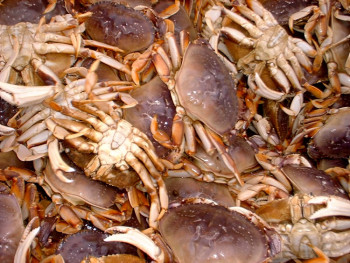 (CDFW) announced. But at the recommendation of state health agencies, the CDFW Director is moving to close the commercial Dungeness crab fishery between Point Reyes and the Sonoma/Mendocino County line and to close the commercial rock crab fishery north of Pigeon Point in San Mateo County. This has the effect of closing approximately 60 miles of coastline to commercial Dungeness crab fishing that otherwise would have opened on Nov. 15. The fishery north of the Sonoma/Mendocino county line is not scheduled to open until Dec. 1. The commercial Dungeness crab fishery had been scheduled to open all the way up to the Sonoma/Mendocino county line (about 60 miles north of Point Reyes) on Nov. 15 and the rock crab fishery is otherwise open year round, but some crabs collected and tested showed elevated levels of domoic acid. The naturally occurring toxin can sicken people who consume crab. Read the rest here 08:08
(CDFW) announced. But at the recommendation of state health agencies, the CDFW Director is moving to close the commercial Dungeness crab fishery between Point Reyes and the Sonoma/Mendocino County line and to close the commercial rock crab fishery north of Pigeon Point in San Mateo County. This has the effect of closing approximately 60 miles of coastline to commercial Dungeness crab fishing that otherwise would have opened on Nov. 15. The fishery north of the Sonoma/Mendocino county line is not scheduled to open until Dec. 1. The commercial Dungeness crab fishery had been scheduled to open all the way up to the Sonoma/Mendocino county line (about 60 miles north of Point Reyes) on Nov. 15 and the rock crab fishery is otherwise open year round, but some crabs collected and tested showed elevated levels of domoic acid. The naturally occurring toxin can sicken people who consume crab. Read the rest here 08:08
Pointing the finger at “angry Fishermen” for Sea Otter shootings, a $20K Reward has been posted
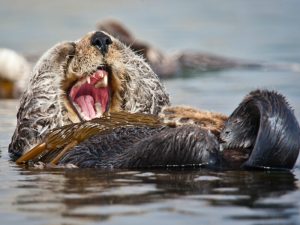 A big reward is waiting for people who can give useful information about who shot dead three sea otters off the Central Coast. The California Department of Fish and Wildlife’s reward of $10,000 for the whistleblowers has been raised to $20,000 after the Center for Biological Diversity announced a similar amount on top of it. Those with information on the sea otter shootings can call the CalTIP line at (888) 334-2258 or the U.S. Fish and Wildlife Service at (650) 876-9078. There is apparent shock over the killing of cute and furry creatures. One report describes how they bring a smile to the face of onlookers, and animal rights advocates are enraged by the wanton killings. In the recent episode, two juvenile otter males and an adult male were killed between late July and early August. The dead bodies were washed up between Santa Cruz Harbor and Seacliff State Beach in Aptos, according to reports. – Read the story here 16:07
A big reward is waiting for people who can give useful information about who shot dead three sea otters off the Central Coast. The California Department of Fish and Wildlife’s reward of $10,000 for the whistleblowers has been raised to $20,000 after the Center for Biological Diversity announced a similar amount on top of it. Those with information on the sea otter shootings can call the CalTIP line at (888) 334-2258 or the U.S. Fish and Wildlife Service at (650) 876-9078. There is apparent shock over the killing of cute and furry creatures. One report describes how they bring a smile to the face of onlookers, and animal rights advocates are enraged by the wanton killings. In the recent episode, two juvenile otter males and an adult male were killed between late July and early August. The dead bodies were washed up between Santa Cruz Harbor and Seacliff State Beach in Aptos, according to reports. – Read the story here 16:07
Outlook improves for Dungeness crab season
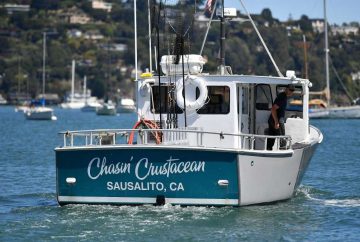 Even though last year’s “blob” of warm water finally dissipated, no one is resting easy — especially after the California Department of Public Health issued an advisory in August against eating rock crab from Half Moon Bay and Monterey Bay after the crustacean tested high for domoic acid. Government agencies and legislators are trying to streamline the process of opening and closing fisheries for the crab season, so that areas that stay free of algal blooms can remain open even if other areas have to close, keeping more safe crab on the table and fishers in business. “We’re cautiously optimistic that we won’t see the widespread pervasive domoic acid levels that are above health alert levels,” said Craig Shuman, marine region manager of the California Department of Fish and Wildlife, who said that safety testing on Dungeness crab will start this month, which is earlier than usual. Read the story here 12:05
Even though last year’s “blob” of warm water finally dissipated, no one is resting easy — especially after the California Department of Public Health issued an advisory in August against eating rock crab from Half Moon Bay and Monterey Bay after the crustacean tested high for domoic acid. Government agencies and legislators are trying to streamline the process of opening and closing fisheries for the crab season, so that areas that stay free of algal blooms can remain open even if other areas have to close, keeping more safe crab on the table and fishers in business. “We’re cautiously optimistic that we won’t see the widespread pervasive domoic acid levels that are above health alert levels,” said Craig Shuman, marine region manager of the California Department of Fish and Wildlife, who said that safety testing on Dungeness crab will start this month, which is earlier than usual. Read the story here 12:05
California Commercial crab season to begin as domoic acid levels drop
 The California Department of Fish and Wildlife lifted prohibitions against fishing everywhere south of the Sonoma-Mendocino county line after state health officials determined the crabs “no longer pose a significant human health risk.” It means the coast is essentially clear of , the potentially deadly neurotoxin that has been found in crabs. Health officials said “low or undetectable levels” of the toxin were found throughout the range, including San Francisco, Half Moon Bay and Monterey. “We’re very happy to be going back to work. We hope everybody gets their big pot of boiling salt water going,” said Larry Collins, president of the Crab Boat Owners Association. Read the rest here 07:48
The California Department of Fish and Wildlife lifted prohibitions against fishing everywhere south of the Sonoma-Mendocino county line after state health officials determined the crabs “no longer pose a significant human health risk.” It means the coast is essentially clear of , the potentially deadly neurotoxin that has been found in crabs. Health officials said “low or undetectable levels” of the toxin were found throughout the range, including San Francisco, Half Moon Bay and Monterey. “We’re very happy to be going back to work. We hope everybody gets their big pot of boiling salt water going,” said Larry Collins, president of the Crab Boat Owners Association. Read the rest here 07:48
The Pirates of Bodega Bay – Crab Fleet still testing crabs with Domoic Acid
 A little-known fact is, Pirates in the 17th and 18th Centuries created one of the first democracies, voting for their captains and quartermasters, and voting them out if things didn’t work out. They weren’t made to walk the plank afterwards, they were merely demoted to the rank of members of the crew. Amazingly these high ideals are still held today, at least by the commercial fishing fleet in Bodega Bay. On Feb. 15, a hearty battle broke out (only verbal) among the fishermen who have recently seen their world fall apart with the dispute over tainted crab. It was somewhat like a manly square dance with captains and crew changing sides frequently but in the end, they all came to an agreement. Lots of info, Read the article here 09:20
A little-known fact is, Pirates in the 17th and 18th Centuries created one of the first democracies, voting for their captains and quartermasters, and voting them out if things didn’t work out. They weren’t made to walk the plank afterwards, they were merely demoted to the rank of members of the crew. Amazingly these high ideals are still held today, at least by the commercial fishing fleet in Bodega Bay. On Feb. 15, a hearty battle broke out (only verbal) among the fishermen who have recently seen their world fall apart with the dispute over tainted crab. It was somewhat like a manly square dance with captains and crew changing sides frequently but in the end, they all came to an agreement. Lots of info, Read the article here 09:20
Commercial Dungeness crab season put off a bit longer

Crab task force opts to continue waiting ‘for the good of the industry’

Video – California Commercial Dungeness Crab Season Could Start Next Week
 State officials opened the central coast of California to recreational Dungeness crab season on Thursday and commercial season could open as soon as late next week, a spokeswoman for the California Department of Fish and Wildlife said. Some state fishermen have said they want to wait until the whole state tests clean before commercial season opens. The California Dungeness Crab Task Force may make a decision on whether to open commercial crab fishing on Tuesday during a conference call to discuss the matter. Video Read the rest here 16:10
State officials opened the central coast of California to recreational Dungeness crab season on Thursday and commercial season could open as soon as late next week, a spokeswoman for the California Department of Fish and Wildlife said. Some state fishermen have said they want to wait until the whole state tests clean before commercial season opens. The California Dungeness Crab Task Force may make a decision on whether to open commercial crab fishing on Tuesday during a conference call to discuss the matter. Video Read the rest here 16:10
Crab fishing boats remain in dock as season closure continues
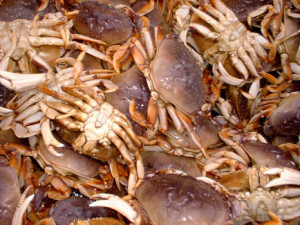 While Dungeness and Rock Crab are off the table, fishermen are losing a source of income. “It’s our life, it really is. Everything revolves around the crab and the boat,” says Lori French, a local fisherman’s wife and the Vice President of Central Coast Women for Fisheries. The delayed crab season has taken a toll on French’s family. “We are living off of savings,” says French. “I don’t think when the press release went out we thought we would be looking at the new year without working and fishing, and here we are at the new year.” Video, Read the article here 09:06
While Dungeness and Rock Crab are off the table, fishermen are losing a source of income. “It’s our life, it really is. Everything revolves around the crab and the boat,” says Lori French, a local fisherman’s wife and the Vice President of Central Coast Women for Fisheries. The delayed crab season has taken a toll on French’s family. “We are living off of savings,” says French. “I don’t think when the press release went out we thought we would be looking at the new year without working and fishing, and here we are at the new year.” Video, Read the article here 09:06
Getting Close! California’s Dungeness crab season still not ready to begin
 “I don’t know when we will reopen,” California Department of Fish and Wildlife Director Charlton Bonham told a legislative committee in Santa Rosa. “You deserve honesty.” Tests by the California Department of Public Health show levels of domoic acid, a biotoxin that has tainted this year’s crabs, have declined to safe levels from San Francisco to Santa Barbara. But it will take another round of clean tests for Fish and Wildlife to consider opening the commercial crab season in those areas, and levels of domoic acid remain high in northern counties from Sonoma to the Oregon border. Read the article here 07:43
“I don’t know when we will reopen,” California Department of Fish and Wildlife Director Charlton Bonham told a legislative committee in Santa Rosa. “You deserve honesty.” Tests by the California Department of Public Health show levels of domoic acid, a biotoxin that has tainted this year’s crabs, have declined to safe levels from San Francisco to Santa Barbara. But it will take another round of clean tests for Fish and Wildlife to consider opening the commercial crab season in those areas, and levels of domoic acid remain high in northern counties from Sonoma to the Oregon border. Read the article here 07:43
El Niño pushes California calamari landings down
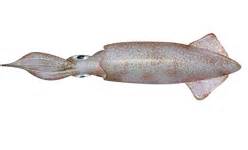 After several years of bounty, California’s commercial landings of market squid — the species better known to hungry diners as calamari — are down by about two-thirds compared to this time last year. The squid are responding to this year’s El Niño conditions, scientists say, but whether their numbers are declining or they’re simply eluding fishermen is unknown, according to California Department of Fish and Wildlife environmental scientist Laura Ryley. Read the article here 15:03
After several years of bounty, California’s commercial landings of market squid — the species better known to hungry diners as calamari — are down by about two-thirds compared to this time last year. The squid are responding to this year’s El Niño conditions, scientists say, but whether their numbers are declining or they’re simply eluding fishermen is unknown, according to California Department of Fish and Wildlife environmental scientist Laura Ryley. Read the article here 15:03
For California salmon, truck rides and bucket lifts
 What do you do when you have 30 million young salmon ready for their big journeys downstream, but drought and development have dried your riverbeds to sauna rocks? In California this year, you give the fish a ride. State and federal wildlife agencies in California are deploying what they say is the biggest fish-lift in the state’s history through this month, rolling out convoys of tanker trucks to transport a generation of hatchery salmon downstream to the San Francisco Bay. Read the rest here 08:45
What do you do when you have 30 million young salmon ready for their big journeys downstream, but drought and development have dried your riverbeds to sauna rocks? In California this year, you give the fish a ride. State and federal wildlife agencies in California are deploying what they say is the biggest fish-lift in the state’s history through this month, rolling out convoys of tanker trucks to transport a generation of hatchery salmon downstream to the San Francisco Bay. Read the rest here 08:45
CDFW to Host Public Meeting on Ocean Salmon Fisheries
 The California Department of Fish and Wildlife (CDFW) invites the public to attend its upcoming annual ocean salmon information meeting. A review of last year’s ocean salmon fisheries and spawning escapement will be presented, in addition to the outlook for this year’s sport and commercial ocean salmon fisheries. The meeting is scheduled Thur., Feb. 26 from 9 a.m. to 3 p.m. at the Sonoma County Water Agency, 404 Aviation Blvd. in Santa Rosa. Read the rest here 20:16
The California Department of Fish and Wildlife (CDFW) invites the public to attend its upcoming annual ocean salmon information meeting. A review of last year’s ocean salmon fisheries and spawning escapement will be presented, in addition to the outlook for this year’s sport and commercial ocean salmon fisheries. The meeting is scheduled Thur., Feb. 26 from 9 a.m. to 3 p.m. at the Sonoma County Water Agency, 404 Aviation Blvd. in Santa Rosa. Read the rest here 20:16
Pressure’s on to help Delta fish suffering amid drought
With populations of numerous endangered Delta fish species at alarming lows, officials in California are planning a number of steps to help them survive if 2015 proves to be a fourth year. The California Department of Fish and Wildlife last week released the results of its annual fall population survey for five key fish species in the Sacramento-San Joaquin Delta. Read the rest here 08:10
Oh WOW, Man. Not the Pot Gardens! – Biologists identify pot gardens as salmon threat
 Water use and other actions by the marijuana industry in the Emerald Triangle of Northern California and Southern Oregon are threatening salmon already in danger of extinction, federal biologists said Tuesday. Concerns about the impact of pot farming were raised by the NOAA Fisheries Service in its final recovery plan for coho salmon in the region. The full plan was to be posted on the agency’s website. Read the rest here 15:38
Water use and other actions by the marijuana industry in the Emerald Triangle of Northern California and Southern Oregon are threatening salmon already in danger of extinction, federal biologists said Tuesday. Concerns about the impact of pot farming were raised by the NOAA Fisheries Service in its final recovery plan for coho salmon in the region. The full plan was to be posted on the agency’s website. Read the rest here 15:38
Yolo County Jury Convicts Sturgeon Poachers
 A Yolo County jury convicted a repeat sturgeon poacher and his accomplice of multiple felonies and poaching charges stemming from a 2010 poaching investigation. They were convicted June 19, with sentencing scheduled for Aug. 1. Read more here 14:40
A Yolo County jury convicted a repeat sturgeon poacher and his accomplice of multiple felonies and poaching charges stemming from a 2010 poaching investigation. They were convicted June 19, with sentencing scheduled for Aug. 1. Read more here 14:40
Squid season booming off Monterey Bay – video
 This year’s squid season kicked off two months ago and it looks like the healthiest squid are off the Central Coast. For the past few years, fishermen say they have had good years for squid fishing in California. But what’s unusual this year is the good quality squid population is right here off the Monterey Bay. Read more here 10:53
This year’s squid season kicked off two months ago and it looks like the healthiest squid are off the Central Coast. For the past few years, fishermen say they have had good years for squid fishing in California. But what’s unusual this year is the good quality squid population is right here off the Monterey Bay. Read more here 10:53

































